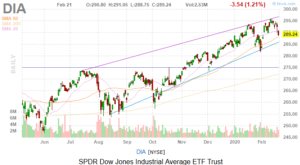It was a miserable end to the week for equities as investors ditched riskier assets for safe-haven fare, such as the dollar and gold. Yes, that’s correct. Despite the U.S. Dollar Index popping today, dollar-denominated gold closed at multi-year highs while stocks tumbled.
Source: Provided by Finviz
- The S&P 500 slid 1.05%.
- The Dow Jones Industrial Average tumbled 0.78%.
- The Nasdaq Composite plunged 1.79%.
- Microsoft (NASDAQ:MSFT) was the worst-performing Dow name today, underscoring weakness across the large-cap tech space.
Covid-19 concerns were again at the center of the broader market decline, but as was noted yesterday, markets are getting wise to the fact that this issue isn’t confined to China — or Asia for that matter — and data are confirming as much.
Earlier today, the IHS Markit purchasing managers’ index for February checked in at 49.6, a decline of 3.7 points from January and good for the worst reading in more than six years.
The weakness “was in part linked to the coronavirus outbreak, manifesting itself in weakened demand across sectors such as travel and tourism, as well as via falling exports and supply chain disruptions,” according to IHS Markit.
In late trading, 21 of the Dow’s 30 components were lower and more than half that group were down 1% or more. Conversely, none of the winners were up 1%.
Coke And Coronavirus
Before jumping into Friday’s tech wreck, let’s have a look at Dow component Coca-Cola Company (NYSE:KO). The defensive stock was up about half a percent in late trading, but investors may do well to not be deceived here.
The company became the latest to warn that the novel coronavirus will affect its earnings, warning of a modest impact to first-quarter results. Fortunately, the soft drink giant said it still expects to earn $2.25 a share this year.
That’s likely the reason why Coca-Cola traded higher today. That and its status as a defensive name. Including Coca-Cola, three of the Dow’s four consumer staples residents were in the green today.
Usual Suspects
Although company-specific news for many of the following names was light to non-existent today, China-sensitive names such as Microsoft, Apple (NASDAQ:AAPL) and Intel (NASDAQ:INTC) were among the Dow’s worst offenders.
In fact, all of the Dow’s technology constituents traded lower today. The only Dow Jones stock with significant China exposure that was higher, and only modestly so, was Caterpillar (NYSE:CAT). That was more a sympathy play on Deere & Company’s (NYSE:DE) strong earnings report than anything else.
Visa Vexed
Visa (NYSE:V) couldn’t escape the tech carnage today, though there was one encouraging news item out on the name. Brazilian state-controlled bank Caixa Economica Federa is working with Visa on credit and debit cards in that country. That bank issues 109.3 million of those cards and Brazil is Latin America’s largest economy.
Speaking of Credit Cards
American Express (NYSE:AXP) was another Dow offender and this is very much a coronavirus-to-blame situation. With global travel expected to slump due to the virus, AXP could be pinched.
AXP is one of Warren Buffett’s “big four” holdings and the Berkshire Hathaway (NYSE:BRK.A, NYSE:BRK.B) annual shareholder letter, always widely anticipated, is due out this weekend, so there could be some AXP commentary in there.
Bottom Line on the Dow Jones Today
Beyond the coronavirus, there’s another issue that could act as a headwind for stocks: they’re getting expensive as John Butters of FactSet points out.
“The forward 12-month P/E ratio of 19.0 on February 19 was above the four most recent historical averages for the S&P 500: five-year (16.7), 10-year (14.9), 15-year (14.6), and 20-year (15.5),” said Butters in a note. “In fact, this marked the first time the forward 12- month P/E had been equal to (or above) 19.0 since May 23, 2002 (19.1).”
Of course, equities can get pricey and continue climbing, but a more sanguine environment than one riddled by fatal illnesses is probably necessary for that to happen.
As of this writing, Todd Shriber did not own any of the aforementioned securities. He has been an InvestorPlace contributor since 2014.
